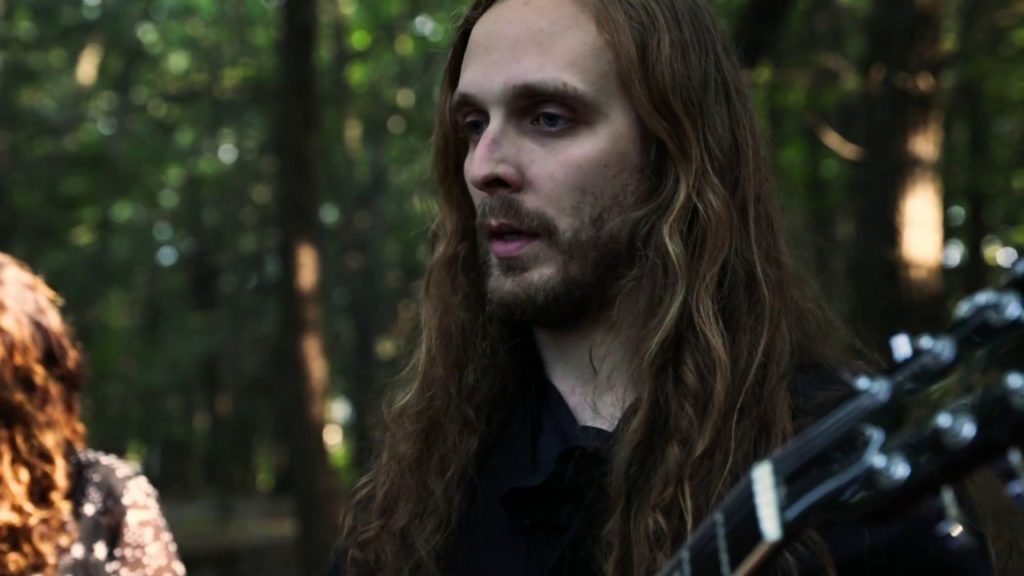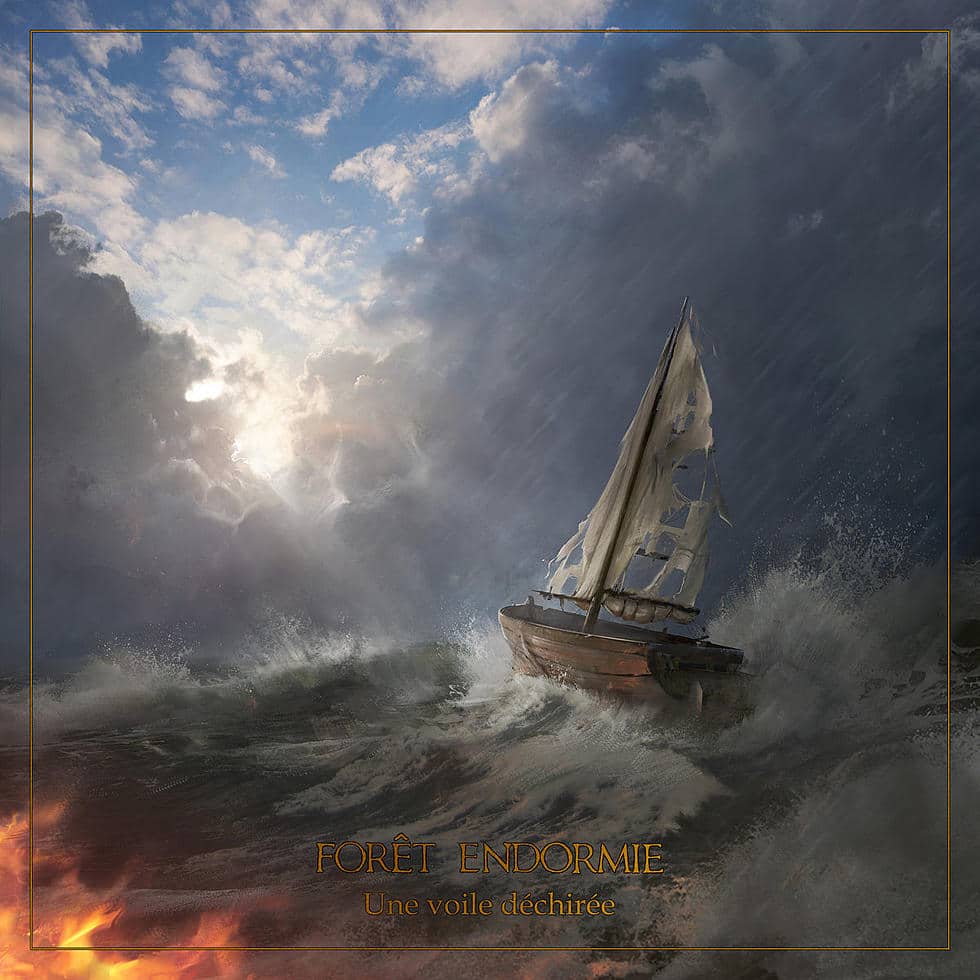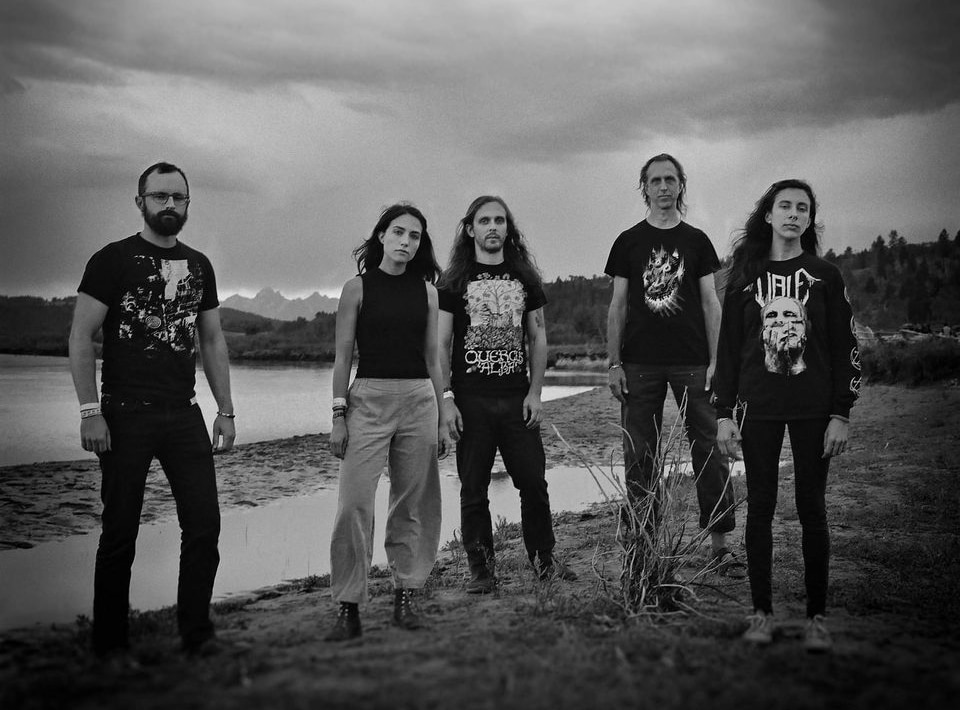
We don’t cover a great deal of music here on Warped Perspective, but I’m delighted for that to start changing, and better still, to get to run a piece with vocalist and guitarist Jordan Guerette: I’ve liked his other band, Falls of Rauros, for some time: if you enjoy progressive black metal which blends with melancholic folk, then I recommend last year’s album Patterns in Mythology (and then work back from there to their previous releases). However, our contact came about via Jordan’s newer project, Forêt Endormie. The project is actually a departure from metal, being instead a chamber ensemble making use of varied instrumentation and vocals: it’s difficult to pin down, but it’s certainly experimental, and has a gentle, morose style which brings elements of folk to the fore. It’s beautiful, a random Bandcamp find which really rewards attention. Jordan was kind enough to talk to me about his music and his inspirations.
WP: So firstly, talk us through where the idea for Forêt Endormie comes from. Outside of Falls of Rauros, was it always your intention to do something of this kind?
JG: The idea for Forêt Endormie goes back to 2010 or so, while I was studying composition as an undergrad. I was really interested in starting a project that would be a vehicle for my more “classical” compositions, and would be equally at home performing in a concert hall or rock venue. I liked the idea of making albums with a dedicated group rather than rely on getting my music programmed on classical “New Music” concerts. I also wanted to include elements – like my voice – that don’t really fit in with what usually gets programmed on classical concerts. It took several years of gestation but in 2016 I wrote a piece called “String and Hammer Quintet” while working on my graduate degree, and I asked the musicians who I wrote it for to basically “start a band” with me. These folks became the first iteration of Forêt Endormie.
WP: Your lyrics and titles are all in French: can you please tell us more about the importance of this aspect of the project?
JG: The French language has long been a passion of mine. I am finishing up my seventh year as a French teacher in a public high school, and French language was my secondary area of study while at university. I also noticed that a lot of the composers that resonated with me were French or Belgian – Debussy, Satie, Messiaen, des Prés.
I feel connected to the language ancestrally and I do feel like it suits the music that I write. I also feel more comfortable singing in a language that’s not my mother tongue, although I recognize that may sound strange. It’s kind of like there’s a little bit of distance between the words I write and how they impact me emotionally. Singing in French sort of lets me be more detached from what I’m singing about, almost like I’m ridding myself of it.
When we’re performing locally it’s reassuring that most of our local audience can’t understand the intensely personal lyrics that I’m singing. Although, a French friend of mine saw us live in Portland and said that he couldn’t understand the words either, so…
WP: What different musical styles influence Forêt Endormie? I noted a lot of what I’d describe as an English folk sound – does that sound accurate, at least to an extent?
JG: You’re definitely on to something! Since I was small I have loved music that is influenced by “English folk” and “Celtic” music, including scores to fantasy movies and video games. I think my introduction to these styles came through New Age music, like Enya, and a compilation of Celtic/New Age music that my Dad and I used to listen to a lot when I was small (The Celtic Heartbeat Collection 2). Another early exposure was playing Ralph Vaughan Williams’ Folk Song Suite in my high school’s concert band – the melodies and harmonic movement in that piece stuck out to me among the music I was learning at that age.
Today, I love John Dowland, Pentangle, Loreena McKennitt, Paul Giovanni & Magnet’s score to The Wicker Man.
WP: You have a very diverse set of musicians working alongside you in Forêt Endormie. How do each of your different backgrounds and styles come together on this project?
JG: I am fortunate to play with musicians who are specialists in different styles and professionally perform jazz, Arabic music, western classical music, and progressive metal. I think a common thread is that most of us went to university for music and are able to read notation and discuss music with a high degree of nuance. Also, everyone I play with is versatile, and listens to all sorts of different music rather than just sticking to their chosen genres. This is important for me – not that a musician “listens to everything” necessarily, but doesn’t box themselves in and is musically curious.

Even more than that, everybody I play with is an extremely thoughtful person, and I am fortunate to be friends with them. I think that has a positive effect on the music!
WP One of your lyrical themes is based around the harshness of the natural world – rather than the picturesque, it’s more centred on the dangerous or the downright hostile in nature. This seems similar to the ideas held during the Romantic era, this idea of nature dwarfing and dominating mankind. What draws you to this kind of focus in your lyrics?
JG: We tend to view nature just as this beautiful thing, because that’s how most of us get to experience it. In my privileged life, I experience nature this way too. And obviously the natural world is beautiful, no question about it. Every climate, every region of the world is pretty amazing. But we live so comfortably and are sheltered from the sheer brutality and uncaringness that is also a part of the natural world. I used to romanticize this idea in my head and sometimes out loud, that we’d better off giving up our comfortable lives and returning to a simpler society, but now, I’m aware of how privileged I am to be able to live in a warm home and have plenty of time to write music. Almost no one in human history can say that.
That being said, I do think that our comfort can sometimes amplify anxiety and depression. For people like me, who have no god or really any spiritual aspect to their lives, it is difficult to grapple with those questions like “what’s my purpose?” when our needs for food and shelter are met relatively easily, at least compared to our ancestors. Lots of time to focus on our individual selves can make us feel like our personal problems are more important and urgent than they are.
So during the writing of Une voile déchirée I was working through these ideas, and conjuring a sense of place and how we are all just temporarily visiting these places seemed to help me expel some personal anxiety. The places and imagery on the record are hostile to humans – the open ocean, underneath storm clouds, a growing forest fire, barren fields – and are metaphors for obstacles we face in our lives, reminders that we’re part of a bigger picture.
WP: What do you feel you can do, thematically and lyrically, with this kind of chamber music which may elude other musical styles?
JG: I think I can take advantage of more different sonic colors, than in more rock-based styles. There is a relatively set instrumentation in Forêt Endormie but I have left it open enough that I feel we could really use whatever instruments we want on the next record. This is less true in other styles, metal especially, that rely on a certain instrumentation. I really, in the context of Forêt Endormie, can do whatever I want musically, which is quite fulfilling.
Lyrically, I have thought about how a more narrative concept album could work well in the context of Forêt Endormie. I also feel no obligation to write “verses” and “choruses”, in fact, I feel a strong push not to.
WP: Forêt Endormie is a quite young band which has always existed in the digital age – alongside the likes of Spotify, Bandcamp and so on. To your mind, what are the pros and cons of being a musician during this time?
JG: As someone who released their first albums in the mid-noughties and so never had a pre-Internet music career, I actually do think that for what I do artistically, the landscape has never been better. It seems like there are more people listening to more different styles of music than ever before, and I’ve been really fortunate to receive the attention of some of these listeners. I just don’t think that the older model of marketing through record stores would have allowed me the career I’ve had so far. And that’s nothing against record stores! I love them and I was a record store manager before I was a teacher. I know a lot of people lament the current state of the industry, and many musicians are worse off than they were 30 years ago, but I actually somehow feel optimistic about the state of the music industry.
WP: And finally – I’m interested to hear about any of your future plans, with Forêt Endormie or anything else – Covid-19 of course allowing…
JG: During COVID I’ve been working on a lot of new music and I’m making the transition to doing music full-time. Falls of Rauros has written and recorded a new album in the last several months – we actually just approved the masters a few days ago! That should be out later this year, hopefully during the summer. I’m also composing music for video games, one of which is called Revenot and is out in beta (“pre-release” version) for Android. I’m also scoring a short film in the spring. A new Forêt Endormie album will come together over the next several months, with plans to release in 2022.
As far as live performance goes, it’s hard to make plans right now. Some of the festivals I was booked on have been cancelled two or three times already, so I’m not really even considering trying to make plans to play live until conditions improve. Normally, I perform often, and it’s been strange to not have that as a part of my life, but it has afforded me more time to write. Forêt Endormie hasn’t played a single show since the release of Une voile déchirée, and it is starting to seem like we’ll have another record out before playing live again!
Thank you so much for the opportunity to chat about our music!
WP: Thank you Jordan! You can check out the band and support them on Bandcamp: check them out here. The Falls of Rauros page is here.
